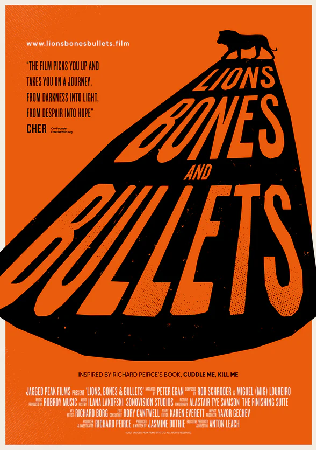
Lions, Bones and Bullets 2021
Distributed by Collective Eye Films, 1315 SE 20th Ave. #3, Portland OR 97214; 971-236-2056
Produced by Jasmine Duthie, Richard Peirce, Yavor Gechev, and Anton Leach
Directed by Anton Leach
Streaming, 72 mins
Middle School - General Adult
Agriculture; International Trade; Wildlife Conservations
Date Entered: 10/18/2022
Reviewed by Kimberly A. Plassche, Map Librarian, Liaison to Geography, University at BuffaloLions, Bones and Bullets (stylized as Lion$, Bone$, & Bullet$ in the film’s opening, for reasons that soon become apparent) follows wildlife conservationist Richard Peirce to South Africa and Southeast Asia as he seeks to expose the realities of lion farming and wildlife product trading. Peirce, known for his work with shark and elephant conservation, shifted his focus to the kings of the jungle when he learned about the predator breeding industry. In 2019, a change in South African law reclassified lions, cheetahs, and thirty other surprising species as agricultural animals, setting the stage for inbreeding, domestication, and farming. Pierce took a documentary crew on his quest to understand why “lions are now cows.”
Heartbreaking video of lions murdered on game hunting preserves, penned in farming facilities, and recovering from abuse achieve the goal of bringing documentary viewers to Peirce’s side. Viewing the degradation and maltreatment of an apex predator leads many to question why wildlife trading continues legally. Why lions? Peirce’s research leads him from South Africa to Laos, where he goes undercover to learn lion products are sold under the guise of tiger bones, which are then used in traditional Chinese medicinal remedies such as tiger wine and cake.
The debate goes beyond the issues of animal abuse and false advertising. Lions raised for sale on the black market are often fed diseased cattle and chickens. They are known carriers of disease including tuberculosis, Covid-19, and influenza. These infectious pathogens can remain in bones and joints of the animals, which are then exported to other countries. A known risk to human health, amid a global pandemic, unfortunately is not alarming enough to stop these practices.
Peirce concludes the only way to stop captive lion breeding is to convince the ranchers that it must end. The farmers argue they are creating needed jobs, and the ideology and reverence of the “king of the jungle” is not enough to challenge their livelihood. Ultimately, Peirce is confident he may have changed at least one rancher’s mind, and the film ends on an optimistic note as news about changes to global regulations appear on screen.
This film is recommended for academic and public libraries. It is a wonderful jumping off point for discussion and research about captive breeding of lions and other animals. The world of lion farming and trade has changed since the filming of this documentary, proving Peirce’s points that the practice needed to stop.
Awards:Jackson Wild Media Awards Winner of the Best Educational Film, US Theatrical Release and Winner, Director's Choice at Illuminate Film Festival
Published and licensed under the Creative Commons Attribution 4.0 license. Anyone can use these reviews, so long as they comply with the terms of the license.